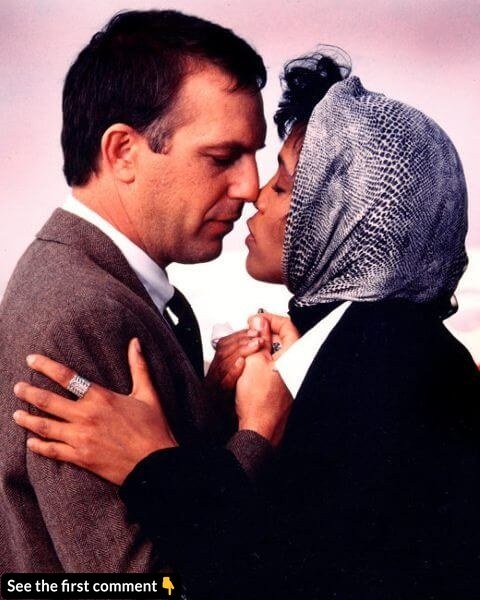I first saw The Bodyguard in the early ’90s—back when MTV still played music videos and movie nights were an event. Even now, decades later, it remains unforgettable: Kevin Costner, all steady resolve and quiet intensity, cast as Frank Farmer, and Whitney Houston, luminous and fearless, debuting on the big screen as superstar singer Rachel Marron. Their on-screen chemistry crackled, and that soundtrack—especially Whitney’s soaring cover of “I Will Always Love You”—became an anthem for an entire generation.
Few realize the film almost never happened. The screenplay, originally penned by Lawrence Kasdan in 1975, was intended for Diana Ross and Steve McQueen. Nearly twenty years later, Kevin Costner—who co-produced as well as starred—insisted Whitney Houston take the role, despite studio skepticism about casting a pop icon with no acting résumé. To him, her presence made perfect sense. “I thought she was the most beautiful woman I’d ever seen,” he later said. His faith paid off: her natural grace and emotional depth brought genuine soul to Rachel’s struggles with fame, love, and danger.
From the opening sequence—Frank weaving through cinematic night traffic to protect Rachel from an anonymous threat—the movie grips you. In one early blooper, attentive viewers might spot the “FUNERAL” placard shifting from one side of a limousine windshield to the other. It’s a tiny glitch, but it’s endearing: even in a high-stakes thriller, the human touches—whether dolls on a bedroom dresser miraculously reappearing mid-scene or a bar code magically scanning only a perforated wristband—remind us of the craft behind the spectacle.
That Oscar night scene strikes a different chord. In reality, nominees sit front and center; in the film, Rachel emerges from the twentieth row as tension mounts. It’s a deliberate deviation—every hallucinatory beat lingering on her while a hidden assassin lines up a shot. When Frank finally leaps forward, gun blazing, and later lies wounded in a hospital corridor without an oxygen mask despite IV drips, the omission strains plausibility. Yet these choices keep our eyes on Costner’s determined countenance and Whitney’s vulnerable expression, ensuring the drama never dulls.
Whitney’s powerhouse vocals elevated every moment. Yet few fans know “I Will Always Love You” was Dolly Parton’s own masterpiece. Dolly herself confessed that the first time she heard Whitney’s version on the radio, she pulled over just to listen. That emotional collision of country roots and pop brilliance echoes the film’s blend of genre: part romance, part action, part musical spectacle.
Behind the camera, the atmosphere wasn’t always celebratory. On January 3, 1992, a tragic accident claimed the life of grip-truck driver William Vitagliano when two lighting cranes collided on a downtown set. The loss cast a pall over production and led to a lawsuit against the equipment manufacturers. It’s a sobering reminder that movie magic often comes with real risks for the crews who bring these stories to life.
One of the most talked-about images—from the theatrical poster showing Frank cradling Rachel—isn’t even Whitney, but her body double. Studios worried audiences might miss the interracial romance, so Costner hand-picked a shot where her face is turned. He later revealed that this composition—her head on his shoulder—was his idea, aiming for evocative intimacy rather than concealing her identity.
Despite critics’ mixed reviews at the time, The Bodyguard grossed over $400 million globally, making it 1992’s second-highest earner and, at one point, the tenth-highest-grossing film ever. Audiences fell for its blend of tender protectiveness and superstar glamour. In his interviews, Costner attributed its success to the “healthy man-woman dynamic”—Frank’s no-nonsense duty of care clashing beautifully with Rachel’s diva demands, culminating in that airport farewell kiss as Whitney’s voice soared over the closing credits.
Several more intimate love scenes were shot but never made the final cut—Frank bathing Rachel in a club bathroom, for example—but Whitney refused to play the ingénue in those moments. “They’re not hiring me to show my ass,” she told Vanity Fair, underscoring her commitment to maintaining personal dignity even amid Hollywood pressures.
Through every dysfunction and detail—misplaced dolls, rubber-banded wristbands, a conspicuous absence of medical realism—the film’s heart beats true. Kevin Costner’s steady heroism and Whitney Houston’s transcendent warmth remind us why we return to this story, again and again. Their parting embrace under airport lights, that last tender kiss, still brings a lump to many throats.
Nearly thirty years on, The Bodyguard remains a study in contrasts: grit and glamour, vulnerability and resilience, the disparity between public performance and private longing. It endures not because it’s flawless, but because its imperfections—both narrative and technical—only deepen its authenticity. Whitney, you will always be missed; Kevin, your steadfast simplicity grounded a thriller in human connection. And together, you taught us that sometimes protecting someone’s heart is the greatest act of love.
